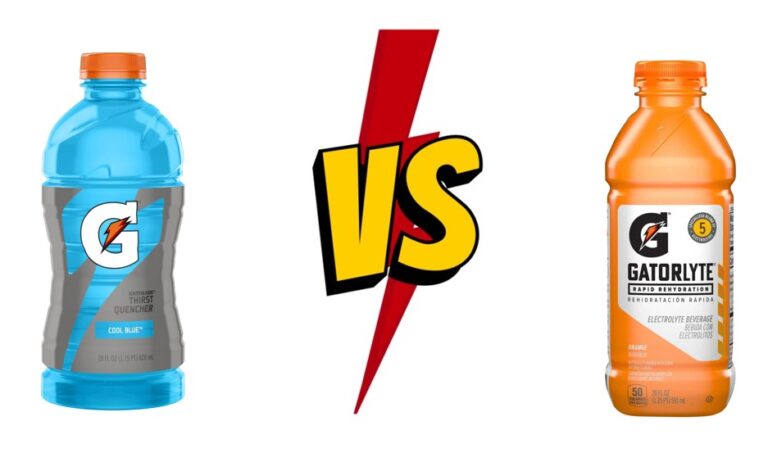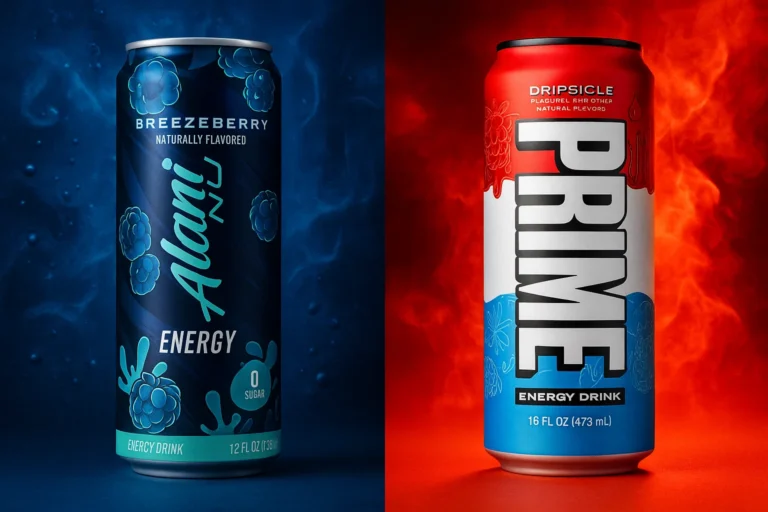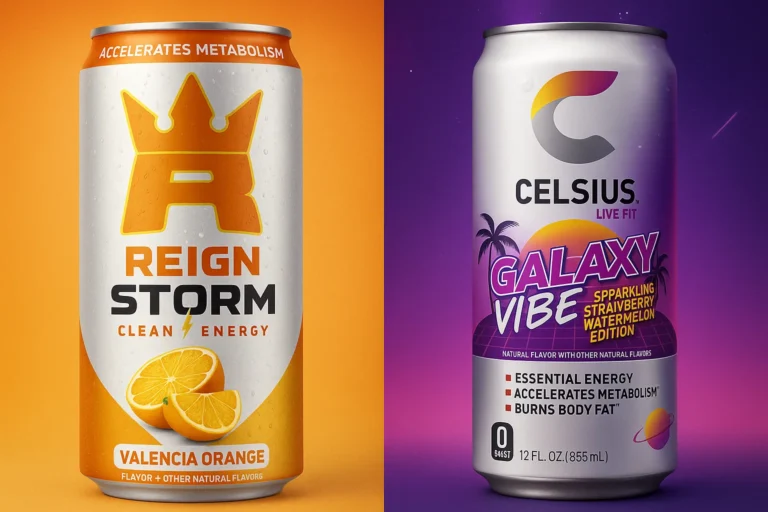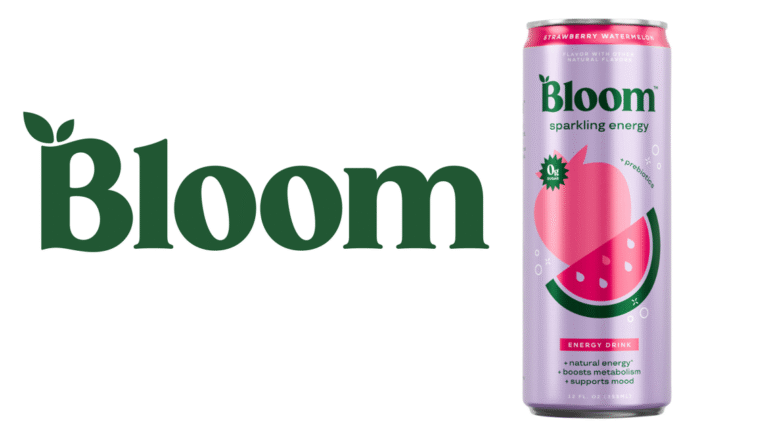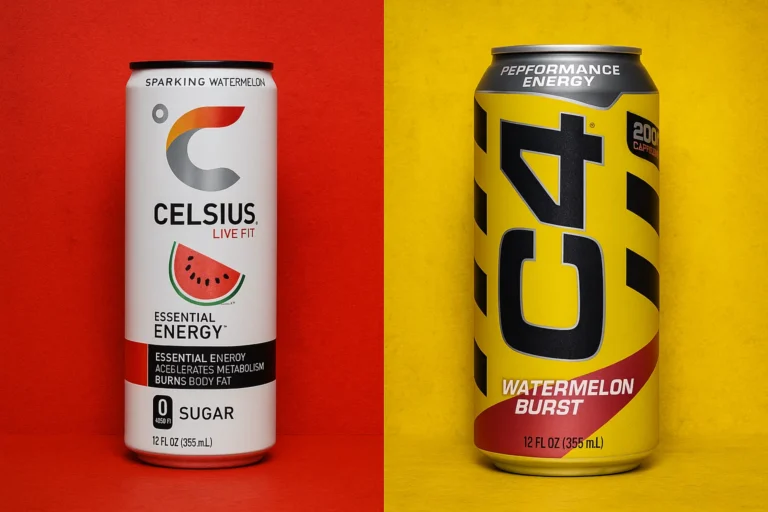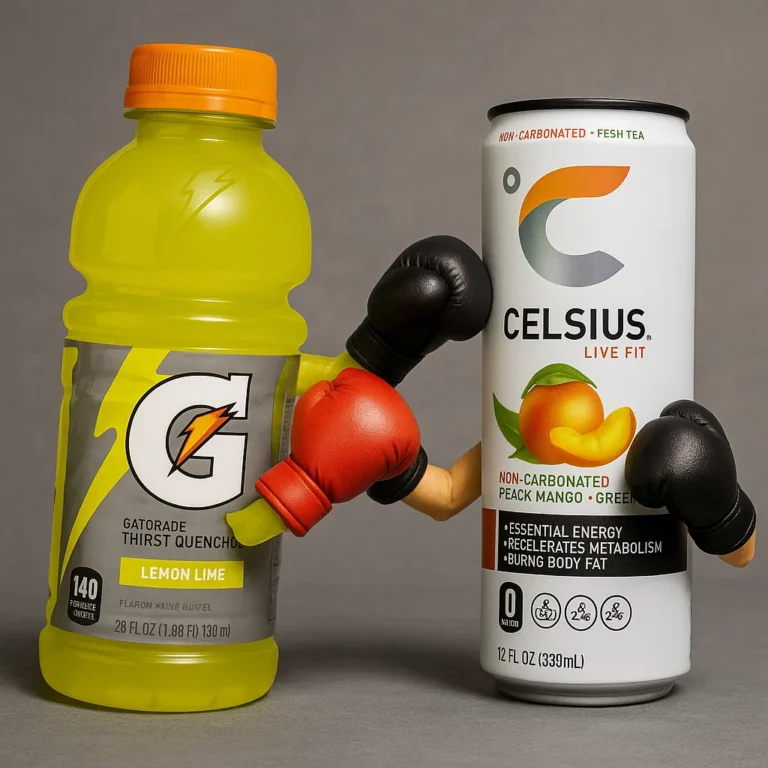Liste of 9 moste Popular Energy Drinks With 100 mg of Caffeine
For context, a standard cup of coffee contains about 95 mg of caffeine, so an energy drinks with 100 mg of caffeine is in a similar range and can provide a quick pick-me-up without overwhelming your body.

Caffeine is a stimulant that affects the central nervous system, primarily by blocking the adenosine receptors in the brain, which helps to reduce feelings of tiredness and promotes alertness. With 100 mg of caffeine, you’re getting a moderate boost, which provides a nice balance between energy and avoiding excessive jitteriness or the “caffeine crash” that larger doses may cause.
Table of Contents
Popular Energy Drinks with 100 mg of Caffeine
Here’s a list of popular energy drinks that contain approximately 100 mg of caffeine per serving:

- Bawls Guarana
Caffeine: 100 mg per 16 oz
Type of Caffeine: Caffeine from Guarana extract
A smooth energy boost derived from guarana, known for its long-lasting effects. - Bucked Up Low-Stim
Caffeine: 100 mg per 16 oz
Type of Caffeine: Caffeine anhydrous and Theacrine (TeaCrine)
A balanced boost, with caffeine anhydrous for quick absorption and TeaCrine for sustained energy without a crash. - Adro
Caffeine: 100 mg per 12 oz
Type of Caffeine: Caffeine anhydrous
Provides a quick boost due to its dehydrated form of caffeine, which is rapidly absorbed by the body. - Jocko Go
Caffeine: 95 mg per 16 oz
Type of Caffeine: Caffeine anhydrous and L-Theanine
Caffeine anhydrous paired with L-Theanine, an amino acid that promotes focus and reduces jitteriness. - Kickstart
Caffeine: 92 mg per 16 oz
Type of Caffeine: Caffeine from green tea extract and guarana
A blend of natural caffeine sources, offering a more gradual energy boost. - Red Bull
Caffeine: 114 mg per 12 oz
Type of Caffeine: Caffeine anhydrous
A quick-acting form of caffeine providing an immediate energy boost. - OCA
Caffeine: 120 mg per 12 oz
Type of Caffeine: Caffeine from organic green tea and yerba mate
Organic, natural caffeine sources for a smoother, cleaner boost with additional antioxidants. - Key
Caffeine: 80 mg per 12 oz
Type of Caffeine: Caffeine from green tea extract
A lighter, more natural caffeine option for those who want moderate energy without a sharp jolt. - Aspire
Caffeine: 80 mg per 12 oz
Type of Caffeine: Caffeine from green tea extract
A refreshing energy boost with a clean and gradual caffeine release from green tea.
Benefits of Energy Drinks with 100 mg Caffeine
Here’s a closer look at the key benefits of consuming an energy drink with 100 mg of caffeine:
- Increased Mental Alertness
- Caffeine is well known for its ability to enhance mental clarity. Whether you’re tackling a big project at work or studying for an exam, a moderate amount of caffeine can help you stay alert and focused on the task at hand. 100 mg of caffeine helps stimulate the brain, improving concentration without making you feel overly wired or anxious.
- Enhanced Physical Performance
- Caffeine is often used as an ergogenic aid by athletes and fitness enthusiasts. It’s shown to improve physical endurance, stamina, and strength, especially during high-intensity workouts. With 100 mg of caffeine, you’re likely to experience a boost in energy levels, allowing you to push through longer workouts or more intense physical activity.
- Mood Boosting
- Caffeine promotes the release of neurotransmitters like dopamine and serotonin, which are known to improve mood. A slight pick-me-up from an energy drink containing 100 mg of caffeine can enhance your mood, helping you feel more positive and less fatigued, especially during mid-day slumps or after a long, tiring period of activity.
- Better Reaction Times
- Caffeine improves reaction times, which is especially beneficial when you need to stay sharp in fast-paced environments, such as driving, gaming, or making quick decisions at work. With the right amount of caffeine, you can expect quicker response times, leading to improved performance in many areas.
- Boost in Metabolism
- Caffeine is a known thermogenic agent, meaning it can increase metabolism and promote fat burning. By increasing your body’s metabolic rate, 100 mg of caffeine can help improve fat oxidation, which is especially useful for those who are trying to lose weight or maintain a healthy weight.
- Improved Alertness Without Overstimulation
- One of the most significant advantages of an energy drink with 100 mg of caffeine is that it provides a more moderate dose compared to larger energy drinks or coffee. This balance makes it easier for individuals to avoid the jitters or the crash that typically accompany larger caffeine doses, while still experiencing increased energy and alertness.
- Convenient and Portable
- Energy drinks are incredibly convenient and easy to take on the go. Whether you’re heading to the gym, preparing for a busy day at work, or need a quick break from a long commute, a 100 mg caffeine energy drink is a fast and effective way to fuel your body and mind without much preparation.
Types of Caffeine in Energy Drinks and Their Effects
Energy drinks typically contain different types of caffeine, and their absorption and impact can vary. Here’s a quick look at some common types:
- Anhydrous Caffeine:
- What it is: Dehydrated caffeine that is typically used in energy drinks. It’s a highly concentrated form of caffeine that is quickly absorbed by the body.
- Effect: Provides a quick energy boost but can also lead to a more intense caffeine “crash” once its effects wear off.
- Caffeine from Guayusa or Green Tea:
- What it is: Caffeine naturally derived from plants like guayusa or green tea. Often considered a “cleaner” source of caffeine.
- Effect: Provides a more gradual and sustained energy release compared to synthetic caffeine.
- Caffeine Citrate:
- What it is: A form of caffeine that is often used in energy drinks and is faster-acting due to its solubility in water.
- Effect: Absorbed quickly into the bloodstream, leading to a faster boost of energy and alertness.
- Caffeine with L-Theanine:
- What it is: A common pairing in some energy drinks, where caffeine is combined with L-Theanine, an amino acid found in tea.
- Effect: Helps reduce jitteriness by balancing the stimulating effects of caffeine, leading to more focused, sustained energy.
Caffeine in Energy Drinks vs Coffee
Caffeine Content Comparison:
- Coffee: A standard 8 oz cup of coffee contains approximately 95 mg of caffeine, depending on the brewing method and type of coffee bean used.
- Energy Drinks: Typically, energy drinks like the ones listed above contain around 100 mg of caffeine per serving, which is slightly more than a cup of coffee.
Additional Ingredients:
- Energy Drinks: Often contain extra ingredients like B-vitamins, taurine, guarana, and L-Theanine. These ingredients can help provide additional energy, mental clarity, and focus. For example, L-Theanine can help moderate the jittery effects of caffeine, creating a smoother energy experience.
- Coffee: Coffee mainly provides caffeine and some antioxidants. It lacks the added nutrients and focus-enhancing compounds found in many energy drinks.
Effect and Absorption:
- Energy Drinks: Energy drinks often use forms of caffeine like caffeine citrate or anhydrous caffeine, which are quickly absorbed, leading to a more immediate effect.
- Coffee: Coffee has a more gradual onset of effects as the caffeine is absorbed more slowly due to its liquid form.
Duration and “Crash”:
- Energy Drinks: While they provide a quick energy boost, energy drinks can sometimes lead to a “caffeine crash” when the effects wear off, especially if they contain a high amount of caffeine or sugar.
- Coffee: The energy boost from coffee tends to last a bit longer, with a slower decline in energy compared to energy drinks.
Sustainability:
- Energy Drinks: With ingredients like L-Theanine and guarana, energy drinks can offer a more sustained and less jittery boost of energy.
- Coffee: Coffee can be more straightforward, with some people experiencing sudden bursts of energy followed by crashes, especially if consumed on an empty stomach.
Who Should Consider Energy Drinks with 100 mg Caffeine?
While most people can benefit from the moderate caffeine dose in energy drinks, it’s important to note that individuals with caffeine sensitivity, pregnant women, or those with certain health conditions may want to limit their intake or avoid energy drinks altogether. For the average person looking for a quick energy boost or a way to stay alert and focused during a busy day, energy drinks with 100 mg of caffeine can be a great option.
Final Thoughts
Energy drinks with 100 mg of caffeine offer a balanced, effective solution for increasing energy, focus, and overall performance. Whether you’re tackling work tasks, hitting the gym, or simply looking to boost your mood, these drinks can provide you with the extra kick you need to power through the day. Just be mindful of how your body responds to caffeine and try to enjoy them in moderation to avoid any unwanted side effects.
So the next time you’re feeling a little sluggish or need an energy boost, consider reaching for an energy drink with 100 mg of caffeine—your body and mind will thank you!

With a Bachelor’s in Biology and Health and a Master’s degree in Quality Control of Foods and Drugs, I review dietary supplements using scientific analysis, ingredient verification, and safety standards to provide transparent and reliable recommendations.


